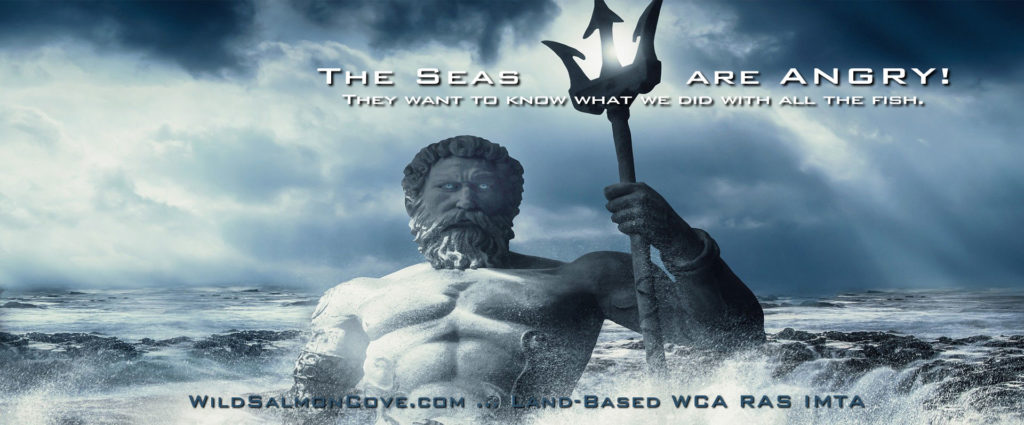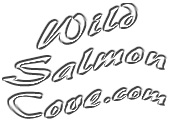Written by Maurice Cardinal …

Open-Net Fish Farms Mandated Out of Canadian Oceans will start to move to closed containment or land-based by 2025

Prime Minister Justin Trudeau announced September 2019, that open-net fish farms in Canada’s oceans will be required to move to LAND-BASED facilities, and that they will be in transition to that end by 2025.
The five year introductory plan was met with mixed reactions, mostly progressive, but also framed with strong comments on either side, especially from ocean based open-net salmon farmers who immediately promised to be aggressive in their resistance.
When moved out of the ocean along BC’s Pacific coast, land-based operations will be variations of RAS and IMTA fish farms. Hopefully, some will also incorporate WCA aquaponics ecosystems, but taking it to that level will be incredibly challenging. It’s true that RAS IMTA does hold the most potential to reinvent fisheries, but the concept has not yet been proven at craft-size, let alone large volume.
As I reported in Salmon Business Magazine, Canadians are already exploring WCA – Wild Caught Aquaculture in very limited numbers. One or two approached it scientifically, and over several years have been building their knowledge base. Others are ex-fishers, distributors, and small processors looking today to capitalize on an opportunity in fisheries, that yesterday, they ironically, tacitly and complicity dragged to the brink of collapse. Those guilty of doing more harm than good over the decades will be dismissed as pirates and opportunists. They are for the most part transparent speculators hoping to get swept up in the rush to new-found gold.
This type of brazen entrepreneur is dangerous for our oceans and fish species because they take an adversarial approach, and don’t understand or respect how communities and clusters work–it takes more than knowing buzzwords. Thankfully, there are dedicated entrepreneurs who have been developing conventional fish farming for several years, and who already understand the challenges.
Canada is promoting an era of team-playing and community, and trust and transparency, which is clearly described in Prime Minister Trudeau’s manifesto for a modern fishery. No other country has taken this initiative – some call it brave while detractors vilify it as reckless. Personally, I think it is progressive and long overdue, but only time will tell. At this point, the make or break conclusion will be dependent on sound political leadership.
WCA proponents have experimented with various versions of wild caught RAS IMTA for a few years, and have amassed unique DATA – the Holy Grail of competition in 2020. Some propose that markets other than salmon might be more lucrative, like sablefish or halibut for example. They are investing and learning how to do it in their own unique ways by raising fish in both land-based and open-net environments. So far though in early 2020, their results have mostly been underreported, except to say that RAS IMTA bio-tech challenges are overwhelming. No one so far, anywhere in the world has been able to do it successfully at large scale, but they are getting close. At this stage it’s still a craft industry, but it’s on the verge of going mainstream.
Playing Mother Nature is way harder than it looks.
The federal government’s long awaited decision to transition fish farms to land-based operations will benefit fish species, as well as our oceans and coastal communities, which in large part on Canada’s west coast are First Nations. Inland fish farms can provide coastal Aboriginal communities with employment in the ocean and on land using the wild caught WCA process.
Someone has to capture the wild fish to grow out in the RAS pools, and First Nations have all the skills, knowledge, and equipment necessary. They also have experience in conventional open-net pens that can be easily transitioned. Land-based fish farms need highly educated and skilled specialists, which means a wide and varied HR pool. Land-based WCA RAS IMTA aquaponics will employ considerably more people than any previous fisheries.
When Prime Minister Trudeau announced the transition in September of 2019, some open-net pen west coast fish farmers reacted immediately and angrily, threatening strong-resistance. It was an expected response, and in general with merit, but it’s not justified when looked at through an environmental and ecological lens. No doubt a move like this will cause open-net pen operators to shoulder considerable cost, but they don’t have to do it alone. The primary issue here is about the health of our oceans and salmon stocks. The government’s plan is to provide support at a number of levels. Everyone wants the transition inland to succeed, especially Fisheries Minister Bernadette Jordan. There is a lot at stake for everyone, including and above all Canada’s oceans and sea life.
The general public, aka seafood consumers are just beginning to understand the ramifications of open-net farming in the ocean, and consequently half-wondering what all the noise is about. Fish are fish, right … hmm, no.
Fish are NOT inanimate objects. Fish feel pain and react to stress like every other living creature – animal or plant. A happy chicken, cow, or fish tastes better–it’s scientific fact. Humanity has not been kind to fish throughout history. Fisheries of all ilk, wild or farmed, for the most part ignore humane methods of harvesting and processing unless forced to through regulation. Land-based farms will incorporate sophisticated in-house humane end of life and processing methods that will be easy and cost effective to monitor. Details like that will add immeasurably to value at the counter, which provides great incentive for companies to self-regulate. SCADA systems operating on IPFS small enterprise blockchain networks will revolutionize fisheries forever and for the better. Traceability will become a foregone conclusion, and it will be cost effective, adding pure value.
Moving open-net fish farms to land-based is confusing even for many in the industry who support the move. Some people believe that land-based fish farming will be relatively easy. The reality however is that running an open-net operation in the ocean does not necessarily mean you have the required knowledge to operate a land-based fish farm at volume. Even at small scale it is a challenge to produce tasty fish at a profit – the key being “tasty”. Each discipline is radically different at a number of fundamental levels. For this reason alone it is understandable that current open-net pen operators are nervous. Competition is fierce and changes like this can put overwhelming pressure on operations already at risk.
Land-based fish farming is still not proven at large volume. Scientifically however, a land-based RAS IMTA aquaponics ecosystem contains all the elements necessary to deliver a perfectly balanced holistic solution. It adds up as plausible on paper, but duplicating an ocean-like environment is challenging, and so far in early 2020 the results haven’t been spectacular. There are exceptions, but they are the true scientific pioneers and tiny players in places like Greenland or Norway. Canadians might be aware of these strategies, but we have zero experience executing at any scale. Even if you embrace the move inland, at this nascent stage it would be like watching football on TV thinking you could be a quarterback. Thanks to data and open source knowledge-share though, we do at least have a playbook.
Armchair land-based fish farmers are now starting to come out of the woodwork armed with only dreams and little more. It’s a repeat of the lucrative 80s and 90s when wild salmon were so plentiful you could get rich just by showing up like a pirate to fill your holds with treasure.
Fishing is not going to be that easy this time.
All the individual components for WCA RAS IMTA are available, and they all work in their silos, but when you combine the different elements needed for a fully functioning ecosystem, the challenges hit light speed quickly. On first blush it sounds like all that is required is to build a few pools and do what open-net pen fish farmers do in the ocean. Almost anyone can Google for solutions already being exercised in Scandinavian countries, then create a fancy 3D video, and you’re off to the races! Even if current open-net ocean fish farmers were to embrace the move to land-based, and so far they haven’t … they still need to update their knowledge and skills to be regarded seriously by investors.
Reinventing fisheries is uncompromisingly complex!
Land-based fish farming at volume means anyone interested has to start from scratch, which levels the playing field considerably. Admittedly by most in this arena, very few at this stage know exactly what they are doing. Some would like you to think so, but it’s mostly boastful conjecture with very few verifiable numbers to back it up, which is a big problem for investors. The same issues existed when the internet first came on the scene–it took well over a decade for anyone to be profitable. The first to profit were the software companies building the tools, and then ten years later in 1994 Amazon showed up and got the ball rolling. It took another full decade for Facebook to launch in 2004.
The land-based fish farming paradigm has very similar growth-and-acceptance challenges.
Disparity between the two very-different fish farming practices is considerable, and it’s what will give the new “pure players” an advantage. They come to the table without preconceived notions or a sense of entitlement. Fresh faces are more capable of finding fresh solutions, and it’s exactly what fisheries desperately need right now – modern and fresh.
For example, open-net fish farming in the ocean demands a regime of antibiotics, pesticides, and vaccines, while land-based RAS IMTA (WCA or not), does not need chemicals and drugs to manage fish health. Why? … because disease in an open-net pen floating in the ocean spreads so rapidly that drugs are often used as a preventative strategy before any appreciable level of disease or sickness is even present. It’s a defeatists’ attitude based on negativity. At the very least, drugs are expensive and increase the cost of seafood at the counter, plus antibiotics linger in the flesh if it’s not purged properly. Open-net fish farmers need specialized pharmaceutical expertise and also highly trained and experienced veterinarian aqua specialists on staff to monitor stock 24/7. It’s a skill open-net fish farmers developed over three decades, and it represents a huge investment in R&D and training. Large pharmaceutical companies stand a lot to lose here, which is a story for another time. Suffice it to say though that pharma has strong incentive to fuel a fire and economically support resistance to change.
WCA RAS IMTA is a more holistic and organic approach, especially when you incorporate aquaponics.
Although chemicals and drugs are not necessary in WCA RAS IMTA ecosystems, there are, as you can see, other specialized skills required that fall under animal husbandry and advanced bio-technology.
Land-Based RAS IMTA demands precision and discipline, and is not for rank amateurs.

Maurice Cardinal has been a fisheries marketing and communications advisor and writer in British Columbia for almost a decade and has worked with leading organisations, NGOs, and governments in Canada and abroad.
